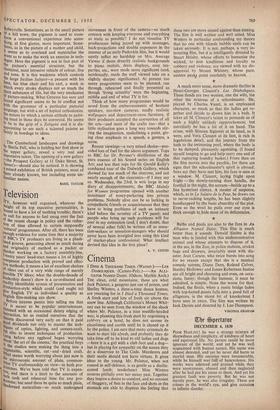Television
ITV, however well organised, whatever the isveight of its top executive personalities, is "rind to have a lot of teething trouble; there's no call for anyone to feel smug over the fact °f the recent change in policy and the reduc- len of time allowed to certain supposedly cultural' proramms. After all, there hasbeen enough evidengce fore some time that a majority BBC's TV producers are living in a plush- 'Med groove, generating about as much daring 'Ind originality of method as a packeror checker working on a factory assembly-line. twenty years' head-start means a lot of highly ,°11.1Petent production with proved and effec- 'le methods; it means a lot of excellent choices of ideas out of a very wide range of merely Possible TV ideas; what the double-decade of leadership doesn't show is a co-ordinated and reachlY identifiable system of presentation and production-style which could (and ought to) Save English TV as individual a quality as English film-making can show. Before anyone panics into telling me that y is meant to be popular enlitertainment, ,runmed with an occasional dainty edging of n,struction, let us remind ourselves that the c' Inema discovered very early on that it paid end dividends not only to master the tech- 1,1_klues of optics, lighting, and camera-craft, but also to invent techniques of production. 1,0 ng before any egghead began worrying bout 'the art of the cinema,' the practical boys the studios ciewere making and - dried craft. wnat seems worth worrying about just now is Microscopic amount of plain, common- ense TV craftsmanship on view—in both pro- aranlunes. We've been told that TV is expen- e, and there is a limit to the amounts of both cash and rehearsal time for any pro- Mme; but need there be quite so much plain, 'hadorned naturalism—so much undesigned
movement in front of the camera—so much concern with keeping everyone and everything as static as possible? I do not visualise TV productions being jazzed up with montages, back-projections and double exposures in the manner of an early Pudovkin film, but it would surely inflict no hardship on Mrs. Average Viewer if those drearily realistic backgrounds to piano recitals, dress displays, cosy tea- parties, etc., were made more significant (and, incidentally, made the stuff viewed take on a slightly sharper significance). At present too many programmes seem to be planned, run through, rehearsed and finally presented as though 'living actuality' were the beginning, middle and end of what TV is for.
Think of how many programmes would be saved from the embarrassments of hesitant speakers, too-slow cameras, madly realistic wallpapers and department-store furniture, if their producers accepted the convention of all the arts—and most of the crafts too—that a little stylisation goes a long way towards stir- ring the imagination, underlining a point, giv- ing clear emphasis to a speech, a gesture, a scene.
Recent viewings—a very mixed choice—pro- vided lots of fuel for the above argument. Tops to BBC for Dr. Pevsner's distillation of the pure essence of his Sound series on English Art; and less than tops for Sir Gerald Kelly's conducted tour of the Dulwich Gallery, which showed far too much of the cicerone, and not nearly enough of the ciceronics—if I may say so. Wednesday, the 23rd, is writ large in my diary of disappointments; the BBC Mainly for Women programme opened with another instalment of nosey-parkering into private problems. Nobody alive can be so lacking in sympathetic friends or acquaintances that they have to bring problems of such an intimate kind before the scrutiny of a TV panel; and people who bring up such problems will for ever in my estimation (and, I don't doubt, that of several other folk) be written off as sensa- tion-seekers or sensation-mongers who should never have been inveigled into using this kind of market-place confessional. What intellect devised this idea in the first place?
A. V. COTON


































 Previous page
Previous page